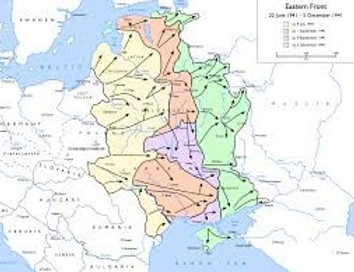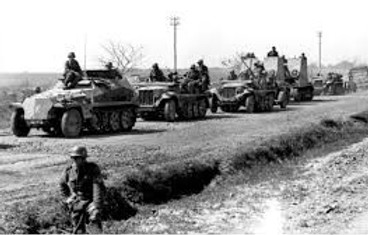
The German Advance
In 1939 the Germans invaded Poland, dividing it with the Soviet Union. This leads Britain and France to declare war on Germany opening the Second World War. After Poland is defeated the Germans quickly invade France. In a matter of weeks, the French army ill prepared for a battle of maneuver is defeated leaving only Britain to stand against the Germans. During this time the first French partisan units are created although unable to do anything as they lack manpower or outside support, to harass German supply lines. On June 22nd, 1941 the German army launched its largest offensive, Operation Barbarossa the invasion of Russia. With the invasion of Russia came a new front in the war and many lands were overrun by German forces. As a result, many Jewish residents in these areas a large number were in immediate danger. In both the west and eastern occupied territories west being France east being Poland, Baltic states Greece and western Russia; Jewish people who escaped German ghettos and mass killings in many cases would seek to fight. Their predicaments outside of fighting and resisting the Germans however were very different depending on their location.


(Above Picture) German Mechanized Forces Advancing Russia 1941 (Below) - Map of German Army group advance Operation Barbarossa 1941
In The West
In The East
In the west specifically France from 1939- 1943 partisan units did mostly minor disruption activities. Most Jews who wished to become partisans in the west joined groups like Free French army. Most Jews in France who could fled into southern France and joined active resistance units there.( "Jewish partisan." Britannica Library)
The Vichy Governments inability to exert full control over the area made this part of France a hotbed for partisan movements ranging from destruction of bridges, trains to communication lines. On 2nd August 1941 two armed Jews committed the first overt act in Paris one of them Samuel Tyszelman was executed shortly after on the 13th. A MOI Jewish unit was able to execute 50 sabotage operations between May 1942-1943 until the original group was caught and executed. Remnants of this group went south and reorganized to continue sabotage operations.( "Jewish partisan." Britannica Library)
The Jewish partisans in these units were generally respected and treated well. Unlike their eastern counterparts their hardships in relation to food and survival were likely far less as being in integrated units that were friendly with the populace reduced the need for other more forceful means of food procurement. When it came to weapons these units were generally well equipped by British intelligence and United states forces to carry out their acts. This made the life of a Jewish partisan in the western theater quite similar to his none Jewish brothers. ( "Jewish partisan." Britannica Library)
Unlike in the western theater partisans in eastern Europe were not united as brothers in the east the war brought out the deep-rooted divisions. Jewish partisans here face many acts of violence or anti-semitism from the local populace and other non-Jewish partisan units. This ranged from outing Jewish partisan units whenever possible by locals, to lack of material support from local peasants or other partisan units. The few units who would work with the Jews were Soviet partisan units and some Greek units these units would although somewhat begrudgingly in some instances accept Jewish men who could fight or allow Jewish women who they would exploit generally to join. This led to the creation of full Jewish Partisan units most notably the Bielski Brothers in Poland who would lead a group that numbered over 1,200 strong at its height. Specifically, in Poland and Western Russia the largest concentration of Jewish partisans would fight, and many would die.( "Jewish partisan." Britannica Library) (Yehuda Baur. “A History Of The Holocaust”)
Compared to their well-equipped and decently fed western counterparts eastern Jewish partisans faced many struggles from weapons to food procurement. Most food had to be procured by force from neighboring villages at gunpoint as most peasants were extremely hostile to Jewish people and partisans in general. Due to a hostile populace the risk of being outed and attacked by German units was high. This lead to some units having to live a nomadic life moving from forest to forest constantly.(Nechama Tec. “Defiance The Bielski Partisans”)
The acquisition of weapons was another struggle that Jews faced who wanted to be partisans. Due to a lack of direct recognition or support most Jewish partisans had to steal weapons from a multitude of sources. They then had to protect their weapons from other Polish and Soviet units which would steal them in some instances. ( "Jewish partisan." Britannica Library) (Margot Stern Strom. “Facing History And Ourselves: Holocaust And Human Behavior”)
This combination of hate, violence, lack of weapons and outside support made being a Jewish partisan on the eastern front very difficult during the early part of the war. Despite this though they would carry out many disruption hits, targeting informants, German police units, station houses, food collection convoys bound for the German army and a host of other activities. (Margot Stern Strom. “Facing History And Ourselves: Holocaust And Human Behavior”)
German Response
The German response to partisan activities was swift and brutal, reprisals were common and any success was met with the killing of one's relatives inside ghettos or camps if their name was known. (Frantisek R. Kraus “But Lidice Is in Europe”)When it came to peasants who helped the Jewish units in the east the Germans would usually kill or imprison those who helped in some instances, they would burn the entire village to deprive the partisans for resources like food. Outside of reprisals the German army left dealing with the partisans to local security forces in many instances. These measures did not prevent already active units from adapting and continue to harass German supply lines. In some areas of Poland as the war progressed the partisans influence through their own hits on informants made some areas essentially contested zones where German authority was nearly absent a testament to their success at waging a guerrilla war from the forests. (Nechama Tec. “Defiance The Bielski Partisans”)

(Above Picture) German Forces in front of a burning farm in eastern Europe (1941)